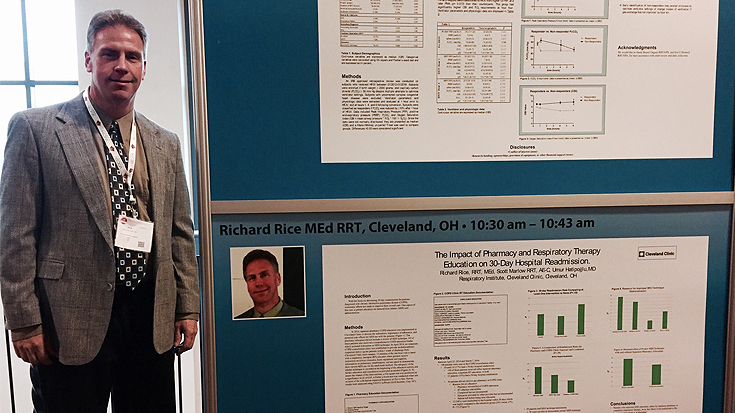
Federal penalties for excessive COPD readmissions have put COPD readmissions on the radar screen of everyone involved in the care of these patients. The problem is finding readmissions reduction programs that really work, and that’s where clinical research must come into play.
Richard Rice, MEd, RRT, COPD/research coordinator in the Respiratory Institute at the Cleveland Clinic in Cleveland, OH, reported the results of a study he conducted in the area during the Editors’ Choice session at the Open Forum held in conjunction with AARC Congress 2016 in San Antonio.
He talks about that study and his passion for research in general in this Q&A –
Why did you decide to study the impact of pharmacy and respiratory therapy education on 30-day hospital readmissions? What piqued your interest in this topic?
I have been involved with COPD care coordination the past few years, with an emphasis on reducing readmissions and improving overall care. One of the issues that became prevalent was access to medications and how often patients really take them. What really piqued my interest was learning that even if this is in place, many patients do not demonstrate proper inhaler technique and thus may not get the desired benefit of taking the medication.
Was this your first time conducting a research study? If not how many other studies have you conducted and where have you presented them or had them published?
No, I have been involved in many other projects and have had four published in peer-reviewed journals, with another currently in press. I have also co-authored eight abstracts and had the privilege of presenting all of them at the AARC Open Forum.
What did you do to gain support from your organization to conduct these studies?
I have been fortunate to work in an organization that highly supports academic involvement.
What were the biggest challenges you faced as you carried out the readmissions study and how did you overcome them?
The biggest challenge was coming up with the study design and implementation. The study was successful because I was able to collaborate with other individuals and disciplines who had an interest.
How difficult was it to work the study into your normal job responsibilities and how did you alter your work routine to make it happen? Do you think it was worth the time and effort?
It is not difficult, but one has to realize the time involved. Much of the work was done at the beginning of the day and at home. The time and effort is definitely worth it.
How did it feel to learn that your abstract had been accepted to the Open Forum – and most especially, that it was selected for the Editors’ Choice session?
It is always a great feeling to be accepted to the Open Forum, and I was even more honored to be selected for the Editors’ Choice session.
How do you think conducting a study like this and having it accepted to the Open Forum is helping to further your career in respiratory care?
I believe it helps by being able to meet others at the AARC Congress who share similar interests. It also provides me with motivation to seek future studies and projects.
What advice do you have for other therapists who might like to follow in your footsteps but just don’t know how to get started?
I think it is important to find a mentor. They can be invaluable in sharing research ideas and critiquing your work and writing.
Are you planning to conduct more studies in the future? If so, what will you study next and why?
I am planning on conducting more studies. The emphasis on reducing COPD readmissions has allowed programs to be put in place for this purpose and to improve overall care. This information fosters critical thinking and is a catalyst for developing new research projects.





